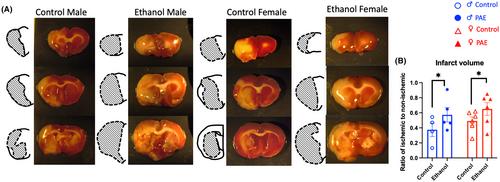Prenatal alcohol exposure worsens acute but not long-term cognitive outcomes due to stroke in middle-aged Sprague–Dawley rat offspring
Abstract
Background
Prenatal alcohol exposure (PAE) is the major cause of developmental disability, ultimately resulting in a wide range of long-term health consequences across the lifespan. PAE adults are at increased risk for metabolic, immune, and cardiovascular disease, and neurocognitive disabilities. However, little is known about the contribution of PAE to adult-onset cerebrovascular disease, specifically ischemic stroke during middle age, a time when stroke incidence and severity typically increase. We hypothesized that PAE would exacerbate both acute consequences and long-term cognitive impairment due to an ischemic stroke in middle age.
Methods
Pregnant Sprague–Dawley rats were exposed episodically to ethanol during the fetal neurogenic period. Middle-aged offspring (12 months old, male and female) from PAE and control dams were subjected to endothelin-1 induced unilateral middle cerebral artery occlusion (MCAo). Separate cohorts of animals were evaluated at 2 days after stroke for neurological and sensorimotor deficits, infarct volume, immune cell types, cytokines, and endocrine factors, and at 3 months after stroke for persistent changes in cognitive function.
Results
In the acute phase, PAE increased brain infarct volume, with an increased expression of proinflammatory mediators in the ischemic hemisphere, paralleled by a reduced CD4:CD8 ratio in circulation. Stroke-induced neurological and sensorimotor deficits were worse in PAE females compared with control females. However, despite the impact of PAE on acute phase outcomes, this treatment did not significantly modify either associative learning (fear conditioning), episodic memory (novel object recognition) or spatial learning (Barnes maze) in the chronic phase.
Conclusions
These data show that PAE did exacerbate acute stroke outcomes in middle-aged offspring, but did not additionally impair long-term cognitive performance after stroke.


 求助内容:
求助内容: 应助结果提醒方式:
应助结果提醒方式:


